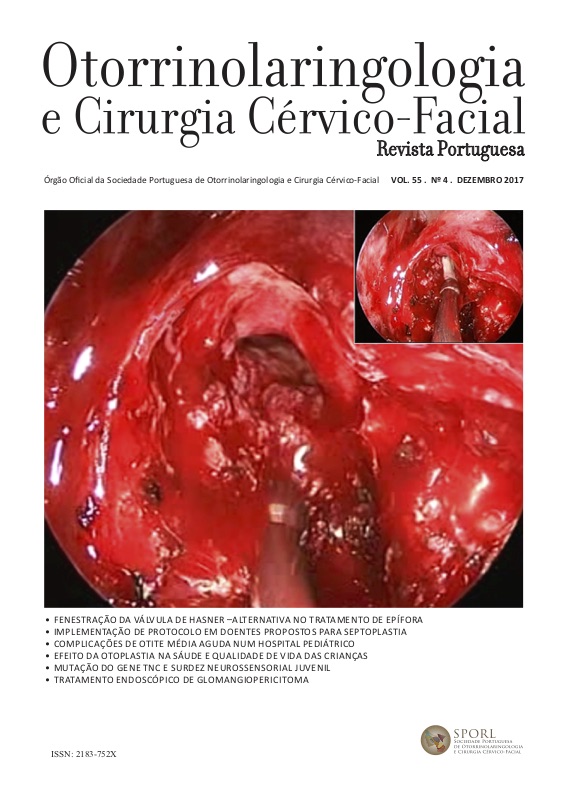TNC gene mutation: A possible rare cause for juvenile sensorineural hearing impairment
DOI:
https://doi.org/10.34631/sporl.678Keywords:
tenascina-C, gene TNC, surdez neurossensorialAbstract
Introdução: Os autores pretendem destacar a importância de um estudo completo e exaustivo visando identificar a causa de casos de surdez isolada em doentes jovens, mesmo na ausência de história familiar.
Descrição de caso: Doente de 20 anos do sexo feminino que se apresenta com um quadro de hipoacusia bilateral progressiva com seis meses de evolução. No exame físico, a otoscopia, a acumetria e o exame vestibular eram normais. A audiometria confirmou surdez neurossensorial bilateral com curva tonal plana, mas as latências e as amplitudes das ondas dos potenciais evocados auditivos do tronco cerebral e a ressonância magnética cerebral foram normais. O estudo genético revelou uma mutação no gene TNC.
Discussão: O gene TNC gene codifica a tenascina-C, uma glicoproteína da matriz extracelular presente na cóclea humana. Esta proteína pode ter um papel na neosinaptogénese após lesão coclear e na homeostasia iónica. De facto, a mutação do gene TNC gene poderá ser responsável por um quadro de surdez pós-lingual autossómica dominante.
Downloads
References
Sliwinska-Kowalska M, Davis A. Noise-induced hearing loss. Noise
Health. 2012; 14(61):274-80.
Mafong DD, Shin EJ, Lalwani AK. Use of laboratory evaluation
and radiologic imaging in the diagnostic evaluation of children with
sensorineural hearing loss. Laryngoscope. 2002; 112(1):1-7.
Bitner-Glindzicz M, Rahman S, Chant K, Marlow N. Gentamicin,
genetic variation and deafness in preterm children. BMC Pediatr.
; 14:66.
Emmett SD, West KP Jr. Gestational vitamin A deficiency: a novel
cause of sensorineural hearing loss in the developing world? Med
Hypotheses. 2014;82(1):6-10.
Mijovic T, Zeitouni A, Colmegna I. Autoimmune sensorineural
hearing loss: the otology-rheumatology interface. Rheumatology
(Oxford). 2013; 52(5):780-9.
De Leenheer EMR, Janssens S, Padalko E, Loose D, et al. Etiological
diagnosis in the hearing impaired newbord: Proposal of a flow chart.
Int J Pediatr Otorhinolaryngol. 2011;75(1):27-32.
Zhao Y, Zhao F, Zong L, Zhang P, et al. Exome sequencing and linkage
analysis identified tenascin-C (TNC) as a novel causative gene in
nonsyndromic hearing loss. PLoS One. 2013; 8(7).
Ali S, Morgan M, Ali UI. Is it reasonable to use 1 and 8 kHz anchor
points in the medico-legal diagnosis and estimation of noise-induced
hearing loss? Clin Otolaryngol. 2015; 40(3):255-9.
Liu Y, Wang L, Feng Y, He C, et al. A New Genetic Diagnostic for
Enlarged Vestibular Aqueduct Based on Next-Generation Sequencing.
PLoS One. 2016 Dec 20; 11(12):e0168508.
Gazquez I, Soto-Varela A, Aran I, Santos S, et al. High prevalence
of systemic autoimmune diseases in patients with Menière's disease.
PLoS One. 2011;6(10):e26759.
Greco A, Gallo A, Fusconi M, Marinelli C, et al. Meniere's
disease might be an autoimmune condition? Autoimmun Rev.
;11(10):731-8.
Boulassel MR, Deggouj N, Tomasi JP, Gersdorff M. Inner ear
autoantibodies and their targets in patients with autoimmune inner
ear diseases. Acta Otolaryngol. 2001 Jan; 121(1):28-34.
Goderis J, De Leenheer E, Smets K, Van Hoecke H, et al. Hearing
loss and congenital CMV infection: a systematic review. Pediatrics.
;134(5):972-82.
de Goffau MJ, Doelman JC, van Rijswijk JB. Unilateral sudden
hearing loss due to otosyphilis. Clin Pract. 2011; 1(4):e133.
Duman D, Tekin M. Autosomal recessive nonsyndromic deafness
genes: a review-Front Biosci. 2012 Jun 1; 17: 2213–2236.
Midwood K, Sacre S, Piccinini AM, Inglis J, et al. Tenascin-C is
an endogenous activator of Toll-like receptor 4 that is essential for
maintaining inflammation in arthritic joint disease. Nature Med. 15:
-780, 2009.
Bitner-Glindzicz M, Pembrey M, Duncan A, Heron J, et al. Prevalence
of mitochondrial 1555A-->G mutation in European children. N Engl J
Med. 2009; 360(6):640-2.
Sabatini LM, Mathews C, Ptak D, Doshi S, et al. Genomic Sequencing
Procedure Microcosting Analysis and Health Economic Cost-Impact
Analysis: A Report of the Association for Molecular Pathology. J Mol
Diagn. 2016; 18(3):319-28.
Svidnicki MC, Silva-Costa SM, Ramos PZ, dos Santos NZ, et al.
Screening of genetic alterations related to non-syndromic hearing loss
using MassARRAY iPLEX® technology. BMC Med Genet. 2015; 16:85.






